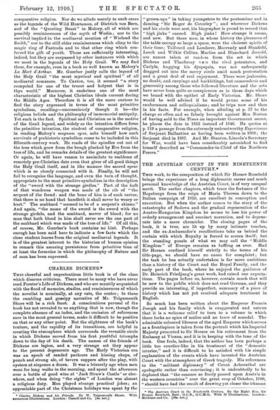CHARLES DICKENS.*
THIS cheerful and unpretentious little book is of the class which disarms criticism. There must be many who have never read Forster's Life of Dickens, and who are scantily acquainted with the flood of memoirs, studies, and reminiscences of which the novelist is nominally, at any rate, the centre ; to these the rambling and gossipy narrative of Mr. Teignmouth Shore will be a rich feast. A conscientious perusal of the book has not revealed to us anything that is new, though the complete absence of an index, and the omission of references save in the most general terms, make it difficult to be positive on that or any other point. But the slightness of the book's texture, and the rapidity of its transitions, are helpful in creating the atmosphere which surrounds the versatile circle in which Dickens moved from his first youthful triumphs down to the day of his death. The names of the friends of Dickens are legion, and a very strange set they appear to the present degenerate age. The Early Victorian era was an epoch of sanded parlours and hissing chops, of punch and strong ale, of tavern suppers after the play, with oysters at sixpence a dozen. It was a leisurely age when men went for long walks in the morning, and spent the afternoon over a bottle of good wine at ` Jack Straw's Castle' or else- where, and when doing " the sights " of London was almost a religious duty. Men played strange practical jokes ; an appreciable part of the Christmas holidays was spent by the • Charles Dickens and his Friends. By W. Teignmonth Shore. With numerous Illustrations. London: Cassell and Co. [Se. net.] " grown-ups " in taking youngsters to the pantomime and in dancing " Sir Roger de Coverley " ; and wherever Dickens and his circle were met, his biographer is proud to record that " high jinks " ensued. High jinks ! How strange it seems, and new. But these men, in whose history the pleasures of the table occupy so large a space, were the choicest Spirit:, of their time; Talfourd and Landseer, Macready and Stanfield, Leech and Wilkie Collins, Mediae and Blanchard Jerrold, are names taken at random from the -set in which Dickens and Thackeray v e...e the rival potentates, and Carlyle, hugging his dyspepsia, was not unfrequently dragged out into the merry circle amid much protestation and a great deal of real enjoyment. There were jealousies, no doubt, and envyings and ba,ckbitings, but camaraderie and generosity among those who followed literature and the arts have never been quite so conspicuous as in those days which we brand with the epithet of Early Victorian. Mr. Shore would be well advised if he would prune some of his exuberances and colloquialisms; and he trips now and then in his facts. For example, when alluding at p. 57 to the charge so often and so falsely brought against Mrs. Norton of having sold to the Times an important Government secret, he places the date in 1852 instead of 1846. He quotes at p. 119 a passage from the extremely untrustworthy Experiences of Serjeant Ballantine as having been written in 1898; the Serjeant died in 1887. And Mr. Stanton, Lincoln's Secretary for War, would have been considerably astonished to find himself described as "Commander-in-Chief of the Northern Forces."










































 Previous page
Previous page